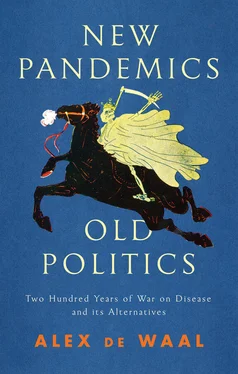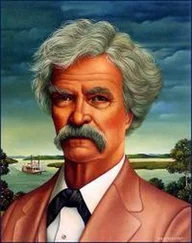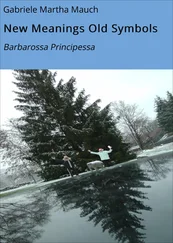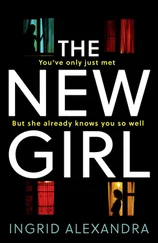Alex de Waal - New Pandemics, Old Politics
Здесь есть возможность читать онлайн «Alex de Waal - New Pandemics, Old Politics» — ознакомительный отрывок электронной книги совершенно бесплатно, а после прочтения отрывка купить полную версию. В некоторых случаях можно слушать аудио, скачать через торрент в формате fb2 и присутствует краткое содержание. Жанр: unrecognised, на английском языке. Описание произведения, (предисловие) а так же отзывы посетителей доступны на портале библиотеки ЛибКат.
- Название:New Pandemics, Old Politics
- Автор:
- Жанр:
- Год:неизвестен
- ISBN:нет данных
- Рейтинг книги:4 / 5. Голосов: 1
-
Избранное:Добавить в избранное
- Отзывы:
-
Ваша оценка:
- 80
- 1
- 2
- 3
- 4
- 5
New Pandemics, Old Politics: краткое содержание, описание и аннотация
Предлагаем к чтению аннотацию, описание, краткое содержание или предисловие (зависит от того, что написал сам автор книги «New Pandemics, Old Politics»). Если вы не нашли необходимую информацию о книге — напишите в комментариях, мы постараемся отыскать её.
New Pandemics, Old Politics — читать онлайн ознакомительный отрывок
Ниже представлен текст книги, разбитый по страницам. Система сохранения места последней прочитанной страницы, позволяет с удобством читать онлайн бесплатно книгу «New Pandemics, Old Politics», без необходимости каждый раз заново искать на чём Вы остановились. Поставьте закладку, и сможете в любой момент перейти на страницу, на которой закончили чтение.
Интервал:
Закладка:
Most scientists’ approach to public messaging has been that facts speak for themselves. This hasn’t worked. Towards the end of his book Spillover , the journalist David Quammen inadvertently shows how scientific thinking loses its compass as it crosses this divide. In 500 pages, he vividly describes the work of virologists who hunt down and analyse pathogens that have either made the zoonotic jump from animals to humans or have a fearsome potential do so. It’s fascinating. These scientists are, he says, ‘our sentries’ who will ‘raise the alarm’. Quammen continues: ‘What happens after that will depend upon science, politics, and social mores, public opinion, public will, and other forms of human behavior. It depends on how we citizens respond.’ Those ways of responding are ‘either calmly or hysterically, either intelligently or doltishly’. 12This is true but it also doesn’t get us far: social scientists and political analysts have useful things to say on these topics. They too have their hierarchy, with economists at the top table. But a pandemic is a rare occasion in which economists don’t have a model to hand, 13though they have much to say about what can be done to mitigate the crises of paying for health care, unemployment, and disruption to international trade. Macroeconomic models that take equilibrium as a premise don’t work when – as in a pandemic – there is by definition no equilibrium.
Politicians talk to their friends and financiers in business, who are also used to making complex decisions quickly in uncertain situations. Business school methods that focus on real-world problems can be useful when the data are speculative and the quantitative formulae have just been thrown out of the window. The core business management question is ‘what is going on here?’ and the answer is given by means of a story that makes sense. So far so good. That works when our intuitions have been refined by experiences that fit the problem. But it doesn’t work when the problem follows a new logic for which our thinking need to be rewired – for example a novel pathogen.
The security advisers have a narrative too. Their job includes planning for a full spectrum of hazards, including all manner of nasty surprises. Military officers and intelligence analysts have played out wargames with both humans and natural disasters as the enemy ‘red team’ and have watched how decision-makers respond to the stresses of the unexpected. One of those exercises, repeated every year or so in governments of industrialized countries, is the crisis of a highly contagious germ introduced either by a terrorist with access to a high-security biotech laboratory, or by natural spillover. So the security analysts consider themselves ready – or at least a step ahead of others. But they can’t anticipate what rules a new virus might follow. They also suffer the handicap of those tasked with imagining the unanticipated, which is that in order to make their story credible – plausible enough to convince a jaded politician – they can only break one or two rules about normality at a time. In the same way that a science fiction movie stretches our imagination on one dimension but sticks to a conventional plotline and characterization so as not to bewilder the audience, so too the pandemic disaster scenario hews to an intuitively resonant human script. These rules are written by the scriptwriter. This is why, almost inevitably, the reality of a pandemic will be stranger than fiction or a security studies wargame simulation. This naturally won’t become clear until later. In emergency mode – and most politicians have an adrenaline rush when there is a real emergency, with top-secret briefings with the highest-ranking generals and spy chiefs – those security-based narratives, scary but familiar, will resonate.
Routinely, a political leader will talk to other politicians. The normal calculus of day-to-day politicking about loyalty, jobs, money, and the media doesn’t stop. We hope that in a national emergency, all those become secondary to the public good. One of the virtues of a pandemic-as-national-security drama is that it allows a leader to rise above party politics and set a truly national agenda, even a global one. Every politician also knows that they should never let a crisis go to waste. For some, the chance for partisan gain trumps the public good. There are benefits to pandemics: an opportunity to seize emergency powers and use them to other ends, spend public money with little oversight, and get on with other factional business while public attention is distracted. Some leaders are denialists. A few are devout denialists, who genuinely think the disease is a hoax or truly have faith that religious piety is sufficient to prevail. Others are tactical denialists, for whom challenging the science or letting turmoil spread brings immediate political advantages. More common are those who pay enough attention to half-convince themselves of a simplified storyline, and then screen out contradictory information.
In a crisis, political leaders don’t usually consult the people, because it’s complicated and takes time and they don’t know what questions to pose. For those who are genuinely committed to democracy, or to finding the best all-of-society way through the crisis, it’s a short-cut that they will come to regret. But the mistake is easily made because there’s no readily available template for a democratic pandemic response.
The ‘War on Disease’ Storyline
It should be clear by now that science cannot provide certainty for political decisions in the moment of a fast-moving pandemic. The ‘war on disease’ storyline steps in for that purpose. The reason why government leaders find it useful is because it’s reassuring. Unfortunately its reassurances are false. To call on a new metaphor, the warfighting script is like those well-worn, half-forgotten clothes at the back of the wardrobe that are pulled out for an unexpected occasion. They don’t really fit but there’s nothing else to wear on the day. And besides, they are at least inconspicuous because everyone else is wearing something similar. Hence the title of this book: the pathogen is novel and unpredictable, the political scripts are familiar and predictable from the first word to the last.
We shouldn’t take the martial language too literally, and those who know it are well aware that it’s not a ‘real’ war. Scientists and public health experts see it as a way of validating their work, as an innocent cover story that appeals to a spirit of solidarity and selflessness and helps us cope with dangers and setbacks. Those are fair considerations, but the script has other consequences too. Policies are standardized and imposed by decree. The archetype is how the German imperial government defeated cholera in Hamburg, described at the end of chapter 2, and the American army’s conquest of yellow fever in Cuba, Panama, and the southern United States, described at the beginning of chapter 3. The way in which HIV and AIDS policies became part of an international security regime is examined in chapter 4, and in chapter 5I will show some of the errors made by militarizing the response to Ebola. In America, the role of soldiers in ‘fighting’ diseases helps validate the apparently limitless expansion of the tasks given to the Pentagon – a definitional inflation that makes ‘war’ at once all-encompassing and meaningless.
Declaring war is also declaring a state of emergency, which is a temptation to autocrats. Labelling the microbe as an ‘invisible enemy’ or an ‘invader’ can imply that those who carry it are also enemies or invaders. In America, the term ‘lockdown’, innocuous in the white suburbs, has the resonance of the New Jim Crow among communities familiar with mass incarceration, where locking down prisoners in their cells is the routine response to a prison disturbance. Lockdowns may provide some immediate safety from physical injury to prisoners but their intent is to protect the prison itself. In countries familiar with civil war and counter-insurgency, the rhetoric and physical attributes of lockdown, such as checkpoints, curfews, and neighbourhood searches, are reminders that there is a thin line between policing a pathogen and policing a hostile population. The warlike language means that advocates for democracy, equity, and justice are constantly at a disadvantage, as their dissent may be seen as sabotaging the war effort.
Читать дальшеИнтервал:
Закладка:
Похожие книги на «New Pandemics, Old Politics»
Представляем Вашему вниманию похожие книги на «New Pandemics, Old Politics» списком для выбора. Мы отобрали схожую по названию и смыслу литературу в надежде предоставить читателям больше вариантов отыскать новые, интересные, ещё непрочитанные произведения.
Обсуждение, отзывы о книге «New Pandemics, Old Politics» и просто собственные мнения читателей. Оставьте ваши комментарии, напишите, что Вы думаете о произведении, его смысле или главных героях. Укажите что конкретно понравилось, а что нет, и почему Вы так считаете.












